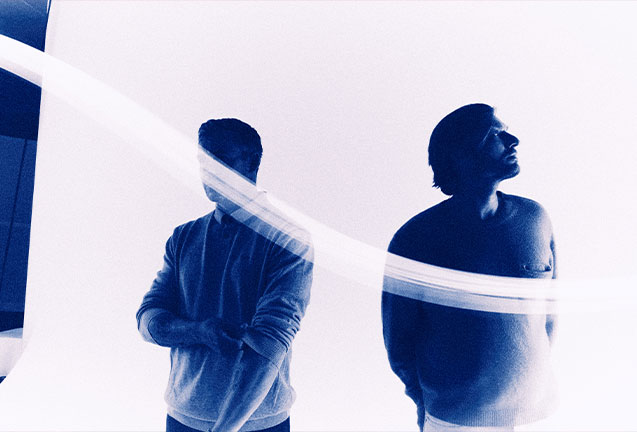The Midnight

Don't say The Midnight didn't warn you. After teasing fans on social media with ominous imagery, snippets of lush keyboard washes, and cryptic references to classic science fiction stories, the band that emerged over a decade ago out of Los Angeles returns with Syndicate, their fifth studio album (not even counting the three EPs released between) and their most ambitious and outward-looking work yet. Syndicate evolves The Midnight's simultaneously retro and forward-looking sound while cementing the band's status as perhaps the most musically and lyrically ambitious act to come out of the burgeoning synthwave scene.
With four singles already released from the 17-track album ("Shadowverse," "Digital Dreams," "Chariot," and "Love is an Ocean,") the listener can already get a sense of the wider canvas the band is painting with. "This is our 'making peace with the apocalypse' record," says singer and lyricist Tyler Lyle.
And while Syndicate's lyrics embrace the unsettled, sometimes paranoid side of the 1980s (few reminisces of the period focus on how preoccupied by nuclear war the eighties were) Lyle's creative partner Tim McEwan brings undertones of anxiety and even doom to the lush synth washes and hooky yet unexpected chord progressions that fans of The Midnight have come to know and love.
The band was born in spring 2012 from the fortuitous meeting of two very different musical sensibilities. Atlanta-born Lyle emerged from the folk-inflected Georgia music scene that grew up around the legendary Eddie's Attic live music venue. "I came to LA thinking I was gonna be the next Mumford and Sons," Lyle laughs, recalling how he was put together with Danish songwriter and multi-instrumentalist Tim McEwan in what he calls "a songwriters' blind date."
The two quickly discovered the overlap of their creative Venn diagram lay in the moody, synthesizer-driven sound that exploded in popularity in the wake of the cult thriller Drive and especially its enormously influential retro-1980s inspired soundtrack. But the new musical direction required a lot of adjustment from both men. "Up until then I'd been moving in more traditional pop circles," recalls McEwan, "and I really had to unlearn those tendencies."
For McEwan, this meant embracing his inner maximalist, using the maxim "If it feels like it's over the top...add more!"
And for Lyle, it meant moving away from narrative-driven lyrics and toward songs that relied more on imagery and pure mood. "I decided at some point that I'm not gonna tell a story," says Lyle, "Instead, I'm gonna describe what the scenery is."
The result is a listening experience that evokes in the listener Proustian sense memories of first loves and afternoons on the couch playing 8-bit video games while simultaneously feeling downright cinematic. In a genre sometimes derided for trafficking in easy nostalgia, The Midnight eschews putting air quotes around the DX7 solo of a 1980s radio hit in favor of washing over listeners and making them feel like they're standing on a rainy street under neon inside a Michael Mann or a Tony Scott movie.
"I got into (mythologist and Hero With a Thousand Faces author) Joseph Campbell and (Swiss psychotherapist and author) Carl Jung in a big way and realized at some point that instead of just being a synth pop band we were building an entire world with all of these archetypes," says Lyle. "We realized we were playing with the imagery of the '80s, but in the same way Springsteen did with midcentury America and factory work and such. That's when it really became fun."
Also notable in a scene more known for studio experimentation, The Midnight quickly emerged as an exciting live rock and roll band with a big and devoted young audience that grew completely outside the major label/radio airplay apparatus, scoring three number one singles on Billboard's electronic music chart, playing major festivals, selling out massive headline tours, and co-headlining a 2024 run with Chromeo. "That always trips me out," says McEwan. "When we first started playing live, I wondered who was gonna show up. Was it just going to be people over 35?"
But the burdens of building and sustaining that audience outside the corporate mainstream took their toll. McEwan recently withdrew from touring to focus on songwriting and studio work, while Lyle dealt with a family health crisis that sent his muse on a voyage into bleak and sunless lands. "I was spending a lot of time in doctors' offices, and thinking about the larger world and are we living in the end of times?" Recalls Lyle. "But the truth is, all eight billion of our individual worlds will end - for each of us the apocalypse always comes."
McEwan, too, found himself grappling with grief, loss and depression during this period. But ironically - or appropriately, depending on one's perspective - their parallel journeys into darkness ended up leaving The Midnight creatively re-energized. "We really reconnected with how much fun we had at the start of this journey," says McEwan. "This record is the most honest and earnest thing we've ever done."
So despite its often heady and heavy themes, Syndicate ends up being less about endings and more of a journey toward an unknown destination. Lyle frames it simply:
"Everything is ending, so let's get started now."